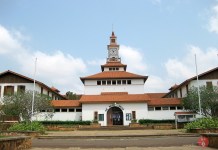The UK is at the moment of maximum risk in the coronavirus outbreak, Boris Johnson has said, as he urged people not to lose patience with the lockdown.
Speaking outside No 10 for the first time since recovering from the virus, Mr Johnson said “we are now beginning to turn the tide” on the disease.
But he said he refused to “throw away” the public’s “effort and sacrifice” and relax the lockdown too soon.
More details on any changes will be given in the “coming days”, he added.
On Tuesday at 11:00 BST, a minute’s silence will be held to commemorate key workers who have died with the virus. Mr Johnson and Scottish First Minister Nicola Sturgeon have both invited the country to take part.
The latest government figures brought the total number of people who have died with the virus in UK hospitals to 20,732, after a further 413 were announced on Sunday.
Daily figures released separately on Monday show a further 329 people have died in England, 13 in Scotland, 10 in Northern Ireland, and eight in Wales.
The numbers for each nation differ slightly from the UK government’s daily figures because of the timeframe they cover.
‘Invisible mugger’
The PM returned to Downing Street on Sunday after more than three weeks off sick.
Mr Johnson apologised for being “away from my desk for much longer than I would’ve liked” and thanked his colleagues who stood in for him - as well as the public for their “sheer grit and guts”.
In the speech on Monday morning, Mr Johnson said he understood concerns from business owners who were impatient to end the lockdown.
But ending it too soon could lead to a second spike in cases and cause more deaths, “economic disaster” and restrictions being reintroduced, he said.
“I ask you to contain your impatience,” Mr Johnson added.
He said there were “real signs now that we are passing through the peak” - including with fewer hospital admissions and fewer Covid-19 patients in intensive care.
- LIVE: PM urges UK to stick with lockdown
- A SIMPLE GUIDE: How do I protect myself?
- AVOIDING CONTACT: The rules on self-isolation and exercise
- HOPE AND LOSS: Your coronavirus stories
- LOOK-UP TOOL: Check cases in your area
And comparing the outbreak to someone being attacked, Mr Johnson said: “If this virus were a physical assailant, an unexpected and invisible mugger - which I can tell you from personal experience, it is - then this is the moment when we have begun together to wrestle it to the floor.
“And so it follows that this is the moment of opportunity, this is the moment when we can press home our advantage, it is also the moment of maximum risk.
“I know there will be many people looking at our apparent success, and beginning to wonder whether now is the time to go easy on those social distancing measures.”
Mr Johnson said the UK has “so far collectively shielded our NHS” and “flattened the peak” - but he could not yet say when or which restrictions would be lifted to ease lockdown.
Once the UK is meeting the five tests for easing restrictions - including a consistent fall in the death rate and making sure the NHS can cope - “then that will be the time to move on to the second phase” in the fight against the outbreak, he said.
But he added: “We simply cannot spell out now how fast or slow, or even when those changes will be made though. Clearly, the government will be saying much more about this in the coming days.”
A Downing Street spokesman said there could be more on how the government will judge the country’s ability to “move forward” by the end of the week.
Labour’s environment spokesman Luke Pollard said he welcomed signs the government would be more transparent about exiting lockdown, saying the party had called for the government to publish its strategy.
Speaking at the Scottish government’s daily briefing, Ms Sturgeon said it was “not the time to throw caution to the wind” and lift lockdown measures - although there had been “real signs of progress”.
Small business loans
Meanwhile, the UK government has announced extra loans for small businesses, after they raised concerns about slow access to existing coronavirus rescue schemes.
Chancellor Rishi Sunak told the House of Commons the scheme would start next week, offering loans to small firms for 25% of turnover, up to £50,000, within days of applying. The loans would be interest free for the first 12 months, he added.
BBC Business editor Faisal Islam said the new scheme has been “aimed at unlocking a backlog of credit checks for smaller loans”.
Loans to larger businesses under the coronavirus business interruption loans scheme will continue to get 80% government-backing.
The political could hardly be more personal.
But the prime minister’s return to work and return to health is far from a metaphor for the country making a quick recovery from the crisis.
In contrast, Boris Johnson’s statement at the lectern this morning was a request to the public to be patient, to keep going, to hold firm through the frustrations of living life mainly behind closed doors for a while longer.
Despite some restlessness among the public, increasing volume in his own party, and from the opposition for a clearer route out of this, for the prime minister it’s not yet the time to give more detail - and certainly not yet the time to change any of the restrictions.
And when that time is reached, when the infection rate is deemed low enough, he was clear, that there will be no sudden nirvana - life in the ‘next phase’ will be a slow return of a more familiar rhythm, acknowledging, but not being swayed by demands to open up the economy much more swiftly.
The PM’s return comes as members of the public have been given the chance to ask a question at the government’s daily virus update from Downing Street. Anyone over the age of 18 can submit a question, which will be chosen by an independent polling organisation.
Mr Johnson was diagnosed with the virus a month ago. He was admitted to St Thomas’ Hospital in central London on 5 April and spent a week there, including three nights in intensive care.
He has not been doing any official government work during his convalescence at his country residence, Chequers, although last week he did speak to the Queen and US President Donald Trump, as well as meeting senior ministers.
Strict limits on daily life - such as requiring people to stay at home, shutting many businesses and preventing gatherings of more than two people - were introduced on 23 March, as the government tried to limit the spread of the virus.
Ministers are required by law to assess whether the rules are working, based on expert advice, every three weeks. The next review is due by next Thursday 7 May.
Testing target
Meanwhile, the government has until this Thursday, the end of April, to hit its target of carrying out 100,000 tests for coronavirus per day.
There were 29,058 tests carried out on Saturday, far short of the target.
On Monday, Downing Street said it could take a “couple of days or more” before it was clear if Thursday’s 100,000 testing target has been met. A spokesman said there was a “time lag” in collating some of the figures, such as on home testing kits.
Speaking on BBC Breakfast on Monday, health minister Edward Argar said the government was increasing the numbers tested “dramatically”.
In other developments:
- Doctors are being urged to look out for a rare but dangerous reaction in children which it’s thought may be linked to coronavirus
- The number of suspected coronavirus deaths at a care home in Renfrewshire has doubled to 22.
- The head of England’s schools watchdog, Ofsted, has said it is in children’s interests to return to school “as soon as possible”
- Plans to resume the Premier League season will step up this week in what has been labelled “Project Restart”
- The boss of retail chain Timpson has warned some UK High Street shops will not survive the coronavirus lockdown
- New Zealand says it has stopped community transmission of Covid-19, effectively eliminating the virus
- Italy has outlined its plans to ease restrictions, allowing more businesses to open and people to visit relatives in small numbers












